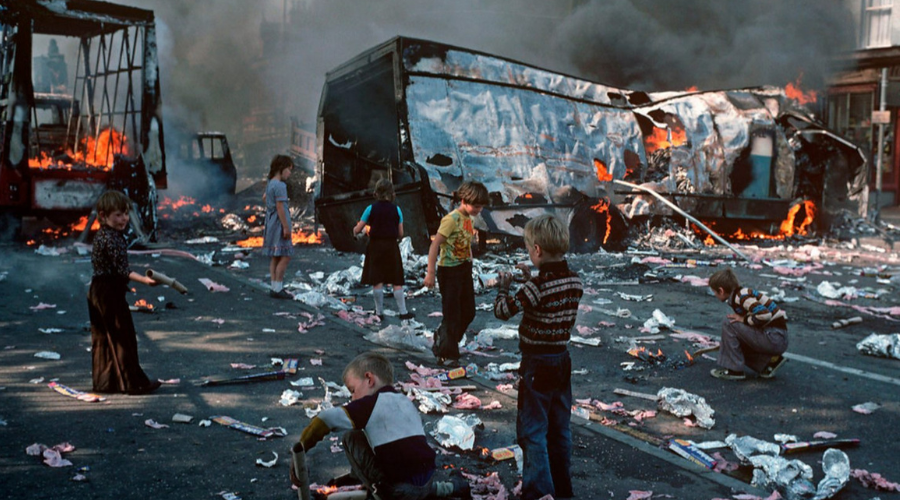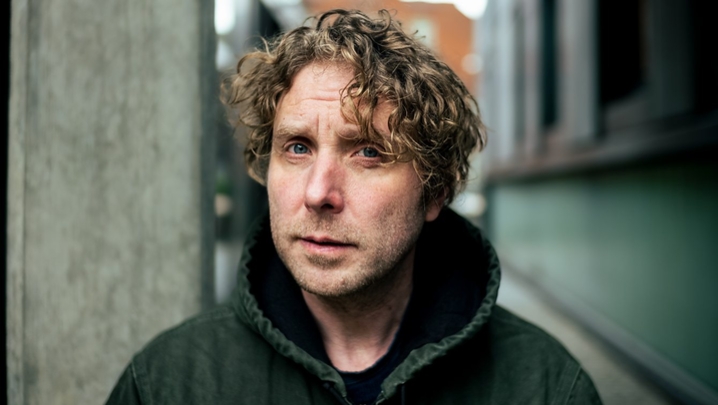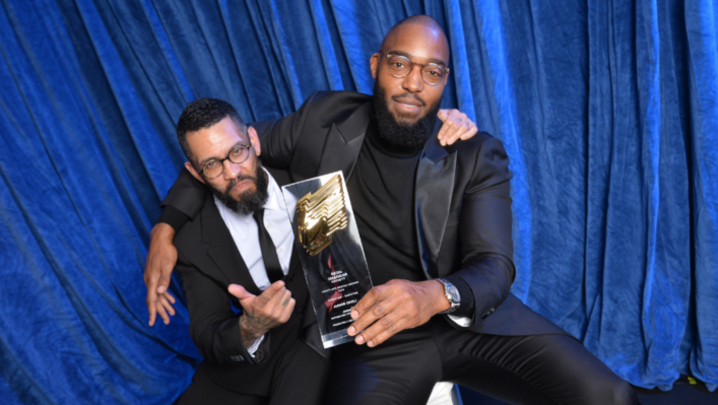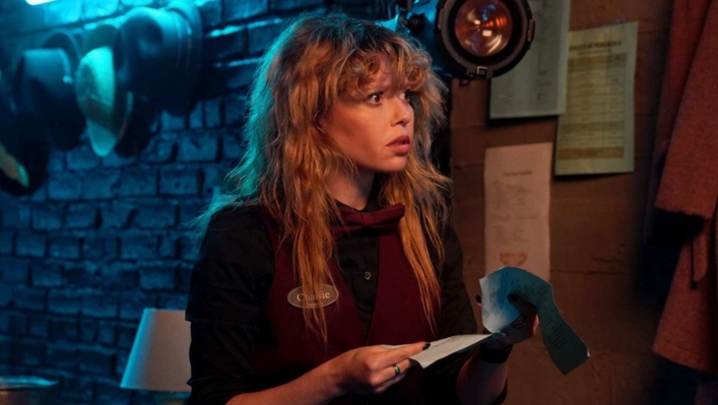Over five-and-a-half hours, Once Upon a Time in Northern Ireland takes its audience through each twist and turn of the Troubles.
As if decades of sectarian violence isn’t a tough enough topic, the documentary opts to tackle it without narration. The closest the programme has to a single guiding voice is the score, composed by Simon Russell.
When he meets for coffee, he has none of the pomp you might expect from someone whose music can navigate heavy topics with such lightfooted ease.
“At the start of every project, I always think ‘This is the one, we’re not going to be able to think of anything’,” he tells me. “I go through the mental image of picking up the phone to the director and saying ‘Sorry, [we’ve] been found out.’”
Russell didn’t study music at university, or even bother to apply. Convinced he wouldn’t get in, he chose instead to study sculpture, playing in bands in his spare time. There was interest from record companies, but not always positive. Labels were judgy, Russell recalls, quick to scrutinise bands’ appearance just as much as their sound.
Documentaries are more his speed. After an initial spell working on adverts, he has indeed been “found out”, not as an imposter, but as an able musician. The reach of his work is international: he knows a score of his has made its way to another country when emails start to trickle in from abroad. Back in the UK, Once Upon a Time in Northern Ireland won the Music Original Score award in the Non-scripted category at the RTS Craft & Design Awards 2023.
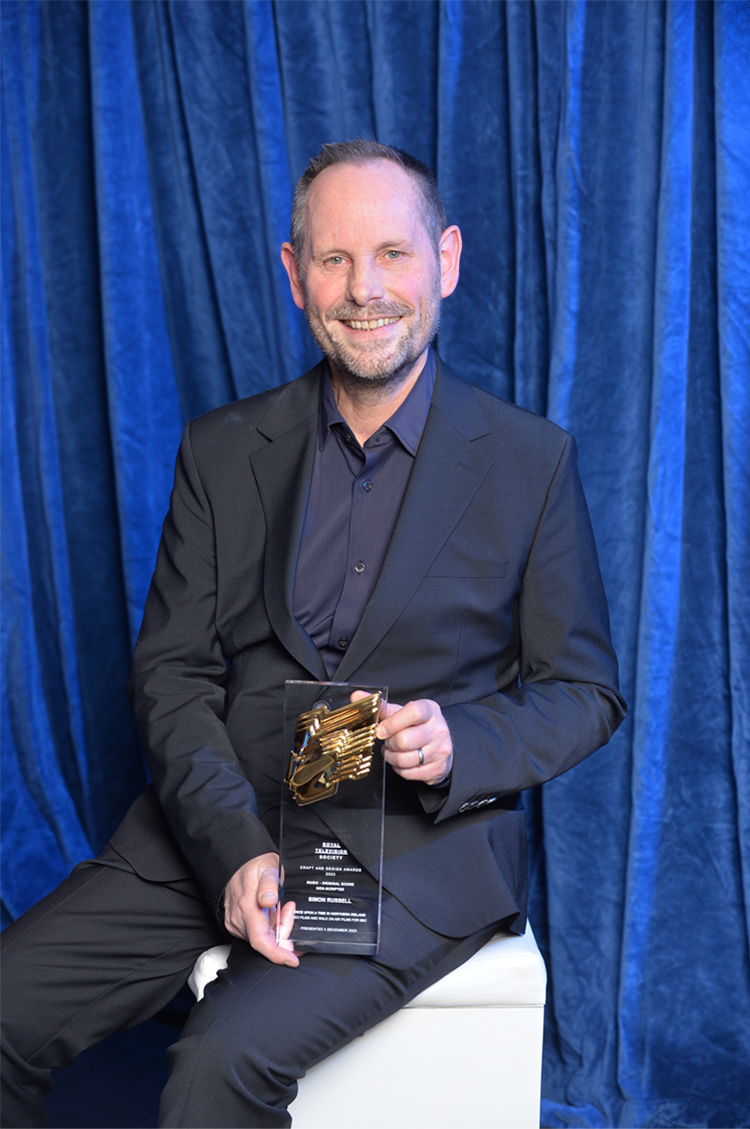
(credit: RTS/Richard Kendal)
Speaking before the win, he tells me that even the recognition that comes from being nominated gives him butterflies. Russell worked closely with director James Bluemel and editor Simon Sykes to craft music that, crucially, didn’t stick out. Some of the earlier ideas for the score, based on music from a film trailer, were too “bombastic”, Russell tells me. The documentary, like a lot of Bluemel’s other projects, is more subtle.
“It’s not like being in a band where you’re onstage and everyone’s come to see you: it’s just helping tell the stories,” he explains.
And tell them he does: as the documentary shows, the Troubles seeped into every aspect of life. There’s the usual coverage of terrorism – both Loyalist and Republican – that might be expected from a programme like this. However, Russell’s score also has to keep up with discussions of childcare responsibilities, couples teasing each other and dispatches from the Belfast punk scene.
The score is the result of 16-18 months’ work, undertaken in-between other projects and beginning at around the same time that the first interviews were being conducted. As such, Russell started out without rough cuts, and sent through initial ideas to Bluemel. Almost all the music, including the finished product, was recorded alone in his loft studio.
“It’s quite daunting having to sound like either an orchestra or a big score, when it's one person,” he says. “It does take me a long time.”
His decision to study fine art instead of music comes back here. Though technical training would have been useful, Russell has found a way to make his self-taught process feel “sculptural”:
“For me, it’s like doing a jigsaw: putting it all together and working out if something’s sticking out.”
Russell and Bluemel are frequent collaborators. The two worked together on Once Upon a Time in Iraq, which – like its Northern Irish near-namesake – dives head first into fraught subject matter. Released in 2020, this documentary tells the story first of the 2003 US-led invasion of Iraq, then of brutal encounters with insurgents, and, finally, the emergence of IS.
A few years prior, he and Bluemel also paired up for Exodus: Our Journey to Europe, as well as its sequel Exodus: Our Journey Continues. Both series gave cameras to refugees making perilous journeys to safety, and quickly earned praise for its gut-punch intimacy.
“The thing I love about working on James Bluemel’s projects is that he gives me so much freedom. On quite a lot of jobs I come to them right near the end,” Russell says, “so it’s more of a rush, whereas for these projects, I get to really experiment.”
Scoring testimony from Iraq was a daunting prospect, he says.
“I was slightly nervous about it, because it’s such a horrendous story,” Russell explains. “I didn’t want to intrude.”
Despite his concerns, the score glides through the documentary with effortless intent. As with Once Upon a Time in Northern Ireland, the music never takes centre-stage, giving it an unknowable quality which only makes it more ominous. Viewers may be absorbed by the Second Battle of Fallujah, for example, but the score is still there in the background, helping to make it so hard to look away.
By staying in the background, the music never leans into the emotion more than it needs to. It evokes, rather than manipulates.
“You’re not trying to push the viewers in a certain way,” Russell explains.
Russell’s last collaboration with Bluemel before Once Upon a Time in Northern Ireland was COVID-era documentary The Virus that Shook the World. The score for that project was “very electronic-based”, Russell tells me. This time round, the music was more acoustic.
“I really love Irish folk music, but I didn’t want to do a score that was flippant, in a way. I wanted to do something that nodded to it.”
He names Irish band Lankum as a particularly strong influence for Once Upon a Time in Northern Ireland, calling their output “traditional folk tunes, but very drone-y and quite menacing”. One of their songs, Go Dig My Grave, tells the story of a girl’s heartbreak and subsequent suicide in nine excoriating minutes. A commenter on YouTube sums it up aptly by describing it as a “funeral dirge from hell”.
Russell also found inspiration in other genres. Electronic bands helped inform the way the tracks build in Once Upon a Time in Northern Ireland, using synths to help build towards a crescendo, he explains.
Of course, no score is perfect. Russell says that if he were to redo any of his, he’d likely make changes. Perhaps this is unsurprising from someone so modest. With the RTS award win, he may need to get used to people liking his work just the way it is.

